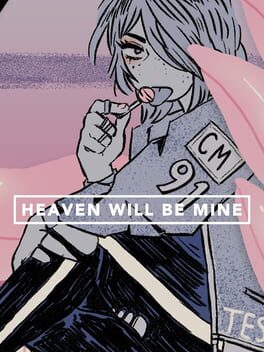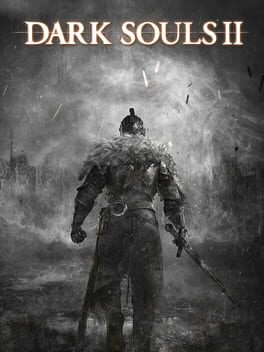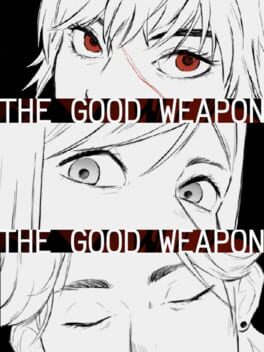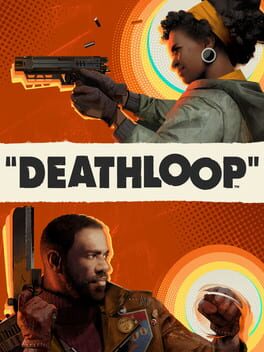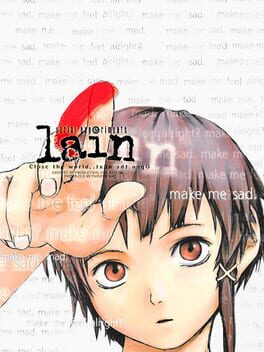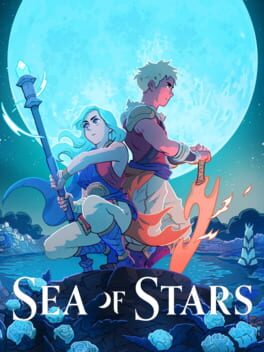katrinavalentina
161 Reviews liked by katrinavalentina
Heaven Will Be Mine
2018
Drakengard
2003
Signalis
2022
Minor spoilers ahead? But probably worth knowing?:
Hey, game designers! If you're going to do a fakeout ending, please signpost it in literally any way! This game signified absolutely in no way that its fake ending was actually fake. Myself and at least 3 other people I've talked to about it fell for it. The credits played in full and I literally uninstalled the game after it because I straight up thought it was over. I only found out that I hadn't actually finished the game because I tried looking up alternate endings and everything was completely foreign! Please just tell me in any clear way that I'm not done please?
Hey, game designers! If you're going to do a fakeout ending, please signpost it in literally any way! This game signified absolutely in no way that its fake ending was actually fake. Myself and at least 3 other people I've talked to about it fell for it. The credits played in full and I literally uninstalled the game after it because I straight up thought it was over. I only found out that I hadn't actually finished the game because I tried looking up alternate endings and everything was completely foreign! Please just tell me in any clear way that I'm not done please?
Dark Souls II
2014
The Good Weapon
2023
Idealistic, to a fault.
I'd like to go completely up my own ass for a second and quote myself in a review I wrote for Citizen Sleeper:
It’s a curious little foible I’ve noticed in a lot of these smaller-scale games with gestures towards socialist thought; pragmatism is dedicated exclusively towards villains, and idealism is dedicated exclusively towards the (virtuous) player character and their (morally unobjectionable) allies.
Given how often this keeps cropping up, I'm thinking of making it something of a hard, observed rule, like Start-to-Crate. It really is everywhere, and The Good Weapon is no exception. It's revealed right at the end of the narrative that the twenty nerve clusters that need to be nuked to defeat the capitalism allegory (here named VIGIL) are actually only eighteen in number; regular people have already destroyed two of them without the help of nuclear ordinance. Wake, being a pragmatist — doubtless why she turns heel — had planned to use two hundred-thousand nukes to carpet bomb the entire planet in the hopes of probably eradicating VIGIL. You, however, manage not to fall into a bloodlust once you gain control of the titular weapon. Instead, you uncover the option to identify and precision strike the remaining eighteen clusters in order to liberate the planet. It would, effectively, be a bloodless revolution that could be over and done with in under forty minutes. However, the player character notices that two of the clusters were killed by "ordinary people". They didn't need nukes. Since the conflict started, these ordinary people have managed to take out about ten percent of the capitalist allegory; 10% of communism has been built. The player character comes to the conclusion that because two clusters have been already killed without nukes, none of the nukes should be fired. Ordinary people should continue to fight VIGIL on their own, and kill off the remaining eighteen clusters by themselves. As for you, you're going to go practice self-care. You and your hot girlfriend named Sleep are gonna go hang out and let the other people fix the planet for you. You could say alongside you, if you're feeling generous.
This is a total resignation, not a triumph. VIGIL still exists. VIGIL is still actively hurting people. VIGIL is still the number one cause of just about every single problem in the world. I cannot think of a single fucking reason why you wouldn't launch the eighteen nukes into the exact spots that they needed to go. Sure, launching the entire stockpile is going to end up murdering the world, and the game even says that it's not guaranteed to work — it actually would have, given the later reveals, but that's besides the point — but there's no presented downside for only using a couple of them on the spots where the clusters are guaranteed to be. If it was specified that the clusters were tucked away under major city hubs, and blowing them up would cause untold civilian casualties in the name of "liberating" them, that'd be a different argument. But we're ultimately given no reason to expect that these surgical strikes wouldn't work, and even further that they wouldn't be the best possible option.
Mark Twain once wrote about how there were two Reigns of Terror in France. The first, and most commonly known, was as swift as it was brutal. It was a terror fueled by passion, by rage, where the downtrodden killed and killed and killed in retaliation for all they had suffered. Heads rolled, the streets ran with blood, and while their goals of abolishing the monarchy were met, it was at an incalculable cost of innocent lives. But the suffering of the revolutionaries that brought them to that point, Twain argued, was the second terror: the slow death, the burning at the stake, the starvation, the cold, the humiliation. To fire two hundred-thousand nukes in the name of overthrowing VIGIL would be the first terror. To walk away from it all and allow VIGIL to continue in its harvest of humanity would be the second. To fire exactly eighteen nukes at the nerve clusters without any named consequence would not so much be a terror as it would be a complete and utter victory for humanity without a single string attached.
I'm harping on this hard, but that's largely because I think it's standing on the line between an oversight and a fundamental disagreement between myself and the author. If the point to get across is that slaughtering innocents in the name of the greater good is indefensible, that's a good argument; if the point to get across is that other people will eventually beat capitalism for you, so just chill out and you won't have to get your hands dirty, I think that's a terrible argument. Whichever way it falls turns this from a piece I'd recommend to an ideological dumpster. Ultimately, I don't know. I'll have to let it hang over my review like the Sword of Damocles.
It's unfortunate, because I do dig a lot of the individual elements of this. I liked the prose; the parenthetical sentence fragments that keep interrupting other sentences seem to be acting as intrusive thoughts, which was a little annoying, but mostly interesting. The little bloop sound effect that played whenever VIGIL talked served as a pretty good way to make it feel voiced and otherworldly without actually having voice acting. The art is mostly good, as well — certainly head and shoulders above a lot of its contemporaries.
But, this being a visual novel, the writing is always going to be a sticking point. I can't say with any real degree of confidence that what's written here works. I'd like for it to. It's certainly in need of a second draft, if nothing else. If the goal really was just to push the idea that you ought to discard revolutionary power and zeal and hope that the world sorts itself out, then The Good Weapon is bad. If it's just a sloppy way of saying that the ends don't justify the means, then The Good Weapon is pretty alright. Which one you believe will depend on how fair you feel like being towards the author.
Considering how the plot is about using nukes to bring about communism, this might be the first Posadist video game.
I'd like to go completely up my own ass for a second and quote myself in a review I wrote for Citizen Sleeper:
It’s a curious little foible I’ve noticed in a lot of these smaller-scale games with gestures towards socialist thought; pragmatism is dedicated exclusively towards villains, and idealism is dedicated exclusively towards the (virtuous) player character and their (morally unobjectionable) allies.
Given how often this keeps cropping up, I'm thinking of making it something of a hard, observed rule, like Start-to-Crate. It really is everywhere, and The Good Weapon is no exception. It's revealed right at the end of the narrative that the twenty nerve clusters that need to be nuked to defeat the capitalism allegory (here named VIGIL) are actually only eighteen in number; regular people have already destroyed two of them without the help of nuclear ordinance. Wake, being a pragmatist — doubtless why she turns heel — had planned to use two hundred-thousand nukes to carpet bomb the entire planet in the hopes of probably eradicating VIGIL. You, however, manage not to fall into a bloodlust once you gain control of the titular weapon. Instead, you uncover the option to identify and precision strike the remaining eighteen clusters in order to liberate the planet. It would, effectively, be a bloodless revolution that could be over and done with in under forty minutes. However, the player character notices that two of the clusters were killed by "ordinary people". They didn't need nukes. Since the conflict started, these ordinary people have managed to take out about ten percent of the capitalist allegory; 10% of communism has been built. The player character comes to the conclusion that because two clusters have been already killed without nukes, none of the nukes should be fired. Ordinary people should continue to fight VIGIL on their own, and kill off the remaining eighteen clusters by themselves. As for you, you're going to go practice self-care. You and your hot girlfriend named Sleep are gonna go hang out and let the other people fix the planet for you. You could say alongside you, if you're feeling generous.
This is a total resignation, not a triumph. VIGIL still exists. VIGIL is still actively hurting people. VIGIL is still the number one cause of just about every single problem in the world. I cannot think of a single fucking reason why you wouldn't launch the eighteen nukes into the exact spots that they needed to go. Sure, launching the entire stockpile is going to end up murdering the world, and the game even says that it's not guaranteed to work — it actually would have, given the later reveals, but that's besides the point — but there's no presented downside for only using a couple of them on the spots where the clusters are guaranteed to be. If it was specified that the clusters were tucked away under major city hubs, and blowing them up would cause untold civilian casualties in the name of "liberating" them, that'd be a different argument. But we're ultimately given no reason to expect that these surgical strikes wouldn't work, and even further that they wouldn't be the best possible option.
Mark Twain once wrote about how there were two Reigns of Terror in France. The first, and most commonly known, was as swift as it was brutal. It was a terror fueled by passion, by rage, where the downtrodden killed and killed and killed in retaliation for all they had suffered. Heads rolled, the streets ran with blood, and while their goals of abolishing the monarchy were met, it was at an incalculable cost of innocent lives. But the suffering of the revolutionaries that brought them to that point, Twain argued, was the second terror: the slow death, the burning at the stake, the starvation, the cold, the humiliation. To fire two hundred-thousand nukes in the name of overthrowing VIGIL would be the first terror. To walk away from it all and allow VIGIL to continue in its harvest of humanity would be the second. To fire exactly eighteen nukes at the nerve clusters without any named consequence would not so much be a terror as it would be a complete and utter victory for humanity without a single string attached.
I'm harping on this hard, but that's largely because I think it's standing on the line between an oversight and a fundamental disagreement between myself and the author. If the point to get across is that slaughtering innocents in the name of the greater good is indefensible, that's a good argument; if the point to get across is that other people will eventually beat capitalism for you, so just chill out and you won't have to get your hands dirty, I think that's a terrible argument. Whichever way it falls turns this from a piece I'd recommend to an ideological dumpster. Ultimately, I don't know. I'll have to let it hang over my review like the Sword of Damocles.
It's unfortunate, because I do dig a lot of the individual elements of this. I liked the prose; the parenthetical sentence fragments that keep interrupting other sentences seem to be acting as intrusive thoughts, which was a little annoying, but mostly interesting. The little bloop sound effect that played whenever VIGIL talked served as a pretty good way to make it feel voiced and otherworldly without actually having voice acting. The art is mostly good, as well — certainly head and shoulders above a lot of its contemporaries.
But, this being a visual novel, the writing is always going to be a sticking point. I can't say with any real degree of confidence that what's written here works. I'd like for it to. It's certainly in need of a second draft, if nothing else. If the goal really was just to push the idea that you ought to discard revolutionary power and zeal and hope that the world sorts itself out, then The Good Weapon is bad. If it's just a sloppy way of saying that the ends don't justify the means, then The Good Weapon is pretty alright. Which one you believe will depend on how fair you feel like being towards the author.
Considering how the plot is about using nukes to bring about communism, this might be the first Posadist video game.
The Devil's Imago
2023
Stunning.
I often find myself being at my harshest when it comes to kinetic novels, though especially towards indie projects made with Twine. I like works that can only operate at their fullest within the medium in which they were originally created; broadly speaking, I don't feel as though many independent written works featured on itch.io satisfy that particular desire of mine. Part of the appeal of visual novels as games rather than as books is through the audiovisual and interactive experience, and not simply the act of reading the text. Adding in music, visual art, player choices which lead to branching paths, warping or otherwise editing text in real-time — these are options that developers can include to capitalize on the fact that they are making video games rather than writing novels. If you include none of these things — if your project is little more than white text on black that you click "Next" to progress through without any ability to change the outcome of the narrative and without playing with the medium — what reason do you have to not simply publish it as a blog post, instead? You haven't done anything unique to the medium. Consider a theoretical game released by a composer that consists of nothing more than clicking on a song title, listening to the song, and then repeating this process for every remaining song. Without entering into an argument about whether this is a "game" at all, consider what I believe to be the more important question: would anything be lost if this wasn't a game? If this was simply an album released to Spotify, would anything be lost? If a Twine project without music or visual art or player choice or edited text was simply released as an article, would anything be lost? Games where you could move their contents to a different medium and lose nothing are inherently uninteresting to me.
To move The Devil's Imago to a different medium would destroy it.
Visually, this is a masterful usage of theming and layering. Diagrams of plant roots are presented next to diagrams of the nervous system. The Hanged Man card is layered directly over-top an image of an impaled man, censoring it. The tarot card spares you the sight once, but a later nightmare sequence allows you to look for a second time and see the true image hidden beneath the card. It's still monochromatic and rendered in a late-Medieval style, so it's difficult to make out exactly what's going on, which only serves to further enhance the horror spiraling out from beneath the narrative. Everything exists in a consistent style and palette; a dithered, sickly green and shades of gray that all melt together into a murky nightmare.
Essentially all of the CGs and sound effects are free stock assets, but they were utilized so well that I didn't even notice until I checked the attached "sources" document. It really speaks to the fact that you can go quite a ways in a creative endeavor without breaking the bank and without immense, broad talent; you don't need to be a master of writing and visual art and sound design and music and programming to make something incredible.
Not to suggest that the creator is untalented; Cecile Richard is very clearly a Renaissance individual who is capable of molding a variety of different media into a singular, cohesive work. A regulatory body ought to investigate them to make sure their personal history checks out; I've got a pet theory that they're a transplant from the Romantic era, sent to our time by some sort of arcane rituals carried out by their fellow Shelleys and Hoffmans. I did notice near the front-end of The Devil's Imago that the prose was remarkably purple for a game so strongly against royalty, but it eventually clicked as I continued to read that the author was invoking the Sublime. To see someone beating the absolute shit out of a thesaurus and slapping in every four-syllable synonym was something that was certainly a lot more impressive in the era before computers did it for you, and it's a common newbie-writer pitfall to include as many of these obscenely long words as you can. While I worried that this would be the case for The Devil's Imago, it isn't; a lot of very simple and very impactful sentences are layered throughout the work, contrasting against the flowery, overwritten, earlier parts of the work. As the narrative goes on and it becomes more and more difficult for the characters featured within to be poetic about the situation, the writing becomes simpler. As the plot becomes more and more inexplicable, it gets more complicated. This is an inspired choice. To be frank, the fact that I can talk about the common trappings of English Romantic-era poetry here and feel completely justified in doing so speaks not just to the quality of Cecile Richard's work, but also how utterly pedestrian a lot of video game writing tends to be. The AAA space with its millions of dollars and hundreds of writers' rooms wishes that it could even remotely compare to works being developed for pennies by a sum total of two people.
Without wanting to risk spoiling The Devil's Imago any more than I already have, I strongly, strongly encourage you to go through it for yourself. I cannot fucking believe that this game is free. This is far and away one of the best visual novels I've ever gone through, both in terms of writing prowess and aesthetic, and it's the exact kind of game that should serve as a monument for other developers to take inspiration from. More creators need to be directly influenced by this.
It only took until March to find the first five-star of the year.
I often find myself being at my harshest when it comes to kinetic novels, though especially towards indie projects made with Twine. I like works that can only operate at their fullest within the medium in which they were originally created; broadly speaking, I don't feel as though many independent written works featured on itch.io satisfy that particular desire of mine. Part of the appeal of visual novels as games rather than as books is through the audiovisual and interactive experience, and not simply the act of reading the text. Adding in music, visual art, player choices which lead to branching paths, warping or otherwise editing text in real-time — these are options that developers can include to capitalize on the fact that they are making video games rather than writing novels. If you include none of these things — if your project is little more than white text on black that you click "Next" to progress through without any ability to change the outcome of the narrative and without playing with the medium — what reason do you have to not simply publish it as a blog post, instead? You haven't done anything unique to the medium. Consider a theoretical game released by a composer that consists of nothing more than clicking on a song title, listening to the song, and then repeating this process for every remaining song. Without entering into an argument about whether this is a "game" at all, consider what I believe to be the more important question: would anything be lost if this wasn't a game? If this was simply an album released to Spotify, would anything be lost? If a Twine project without music or visual art or player choice or edited text was simply released as an article, would anything be lost? Games where you could move their contents to a different medium and lose nothing are inherently uninteresting to me.
To move The Devil's Imago to a different medium would destroy it.
Visually, this is a masterful usage of theming and layering. Diagrams of plant roots are presented next to diagrams of the nervous system. The Hanged Man card is layered directly over-top an image of an impaled man, censoring it. The tarot card spares you the sight once, but a later nightmare sequence allows you to look for a second time and see the true image hidden beneath the card. It's still monochromatic and rendered in a late-Medieval style, so it's difficult to make out exactly what's going on, which only serves to further enhance the horror spiraling out from beneath the narrative. Everything exists in a consistent style and palette; a dithered, sickly green and shades of gray that all melt together into a murky nightmare.
Essentially all of the CGs and sound effects are free stock assets, but they were utilized so well that I didn't even notice until I checked the attached "sources" document. It really speaks to the fact that you can go quite a ways in a creative endeavor without breaking the bank and without immense, broad talent; you don't need to be a master of writing and visual art and sound design and music and programming to make something incredible.
Not to suggest that the creator is untalented; Cecile Richard is very clearly a Renaissance individual who is capable of molding a variety of different media into a singular, cohesive work. A regulatory body ought to investigate them to make sure their personal history checks out; I've got a pet theory that they're a transplant from the Romantic era, sent to our time by some sort of arcane rituals carried out by their fellow Shelleys and Hoffmans. I did notice near the front-end of The Devil's Imago that the prose was remarkably purple for a game so strongly against royalty, but it eventually clicked as I continued to read that the author was invoking the Sublime. To see someone beating the absolute shit out of a thesaurus and slapping in every four-syllable synonym was something that was certainly a lot more impressive in the era before computers did it for you, and it's a common newbie-writer pitfall to include as many of these obscenely long words as you can. While I worried that this would be the case for The Devil's Imago, it isn't; a lot of very simple and very impactful sentences are layered throughout the work, contrasting against the flowery, overwritten, earlier parts of the work. As the narrative goes on and it becomes more and more difficult for the characters featured within to be poetic about the situation, the writing becomes simpler. As the plot becomes more and more inexplicable, it gets more complicated. This is an inspired choice. To be frank, the fact that I can talk about the common trappings of English Romantic-era poetry here and feel completely justified in doing so speaks not just to the quality of Cecile Richard's work, but also how utterly pedestrian a lot of video game writing tends to be. The AAA space with its millions of dollars and hundreds of writers' rooms wishes that it could even remotely compare to works being developed for pennies by a sum total of two people.
Without wanting to risk spoiling The Devil's Imago any more than I already have, I strongly, strongly encourage you to go through it for yourself. I cannot fucking believe that this game is free. This is far and away one of the best visual novels I've ever gone through, both in terms of writing prowess and aesthetic, and it's the exact kind of game that should serve as a monument for other developers to take inspiration from. More creators need to be directly influenced by this.
It only took until March to find the first five-star of the year.
Citizen Sleeper
2022
I will not mention Disco Elysium in this post.
Citizen Sleeper is a narrative-adventure game much heavier in the way of narrative than adventure. From the outset, you're given a handful of six-sided dice per day and told that you're allowed to spend them however you want in order to find your place onboard this ringworld station. Your start is going to be appropriately alien and confused, with you getting lost, and making mistakes, and taking hits to your very limited resources. As time marches on and more of the station opens itself up to you, you'll be given the opportunity to spend your dice on an ever-growing list of activities under the threat of time pressure. You can only do so much, the game warns, and your time is the most valuable resource of all.
This isn't true. You can do everything in one playthrough without any real challenge.
In fact, there's so much to do that your struggle is mostly going to be figuring out how to spend your off-days, when all of the NPCs who can progress the story wind up gating you behind a timer of arbitrary length before you can speak with them again. To be frank, I can barely remember most of their names. They all fit a bit too neatly into their archetypes — Good Dad with Cute Daughter, Hackerman, Gold-Hearted Gang Member — and you can kind of see where all of these people are going to end up hours before they actually get there. The story as a whole is too obvious for its own good.
This is a world where that which is moral is that which is correct. It’s a curious little foible I’ve noticed in a lot of these smaller-scale games with gestures towards socialist thought; pragmatism is dedicated exclusively towards villains, and idealism is dedicated exclusively towards the (virtuous) player character and their (morally unobjectionable) allies. You get a bounty hunter set upon you in the early stages of the game, and his entire deal is that he’s willing to not turn you in so long as you keep paying his bar tab. I was ready to dig in, pay up, and take the hits at the cost of buying my own freedom. However, you only need to pay once, because he gets so shitfaced after the first time you pay him off that he drops his gun the next time you see him.
You can give it back to him.
You can give the guy who has a price on your head his own gun back, and you suffer literally zero penalty for this because the bartender stole his bullets while neither of you were looking. He then gets kicked out and completely ceases to be a problem. In terms of pragmatism, giving a bounty hunter who’s coming after you a gun is a miraculously fucking stupid idea. But if you look at it idealistically, you’re refusing to point the gun at him because you’re not going to do violence unto violence, or something. The same thing happens again with the Killer AI; killing it results in your friend NeoVEND dying with it, while binding it eternally in a hellish loop from which it can never escape is the more difficult and thus more “moral” option, so NeoVEND gets to live.
There’s a long, long questline of exposing corruption on the station in the interest of getting your tracker disabled, and it seemed like the closest thing to a core path that the game was offering. There’s a timer constantly ticking down to warn of hunters being set upon you, with the final and most dangerous one taking something like 24 cycles to complete; an in-game “day” is counted as one cycle, so this is an absurd amount of time. I managed to get the tracker disabled with about 16 cycles to spare. And just like that, my body was no longer considered the property of my owners. They wouldn’t come looking for me, anymore. I was free. I could live out the rest of my days onboard this station in my little apartment that I made, hanging out with my stray cat and moving crates all day to buy fungus bowls and stabilizer shots while helping out at the greenhouse commune.
I was satisfied with that, but the game told me that I wasn’t. If I wanted to see credits, I was going to have to either figure out a way to leave the station right now, figure out a way to leave the station eventually, or destroy my body to live in the cloud. The credits rolled for every time I insisted on sticking around — three times in total, four with the DLC — and it wasn't hard to get the feeling that I was overstaying my welcome.
Uh. Why?
No, seriously, why? The Eye is a decent place with good people who I just sunk tons of time and resources into helping. Why leave? Why even think about leaving? Where am I gonna go? A different station, somewhere else, to do it all over again from scratch? Why should I forsake my body and go full computer when we’ve made the point time and again that Sleepers aren’t just programs, and are in fact the sum of their parts, tangible or otherwise? I know that the game needs to end, because a story can’t go on forever, but why like this?
I suppose this was a common complaint, because the DLC addresses the problem by tossing in what you could charitably call an actual endgame scenario, and what you could less charitably call rocks fall, everyone dies. I'm not sure how many people here have ever read a fanfiction as it's being published — don't be shy, I know it's a lot of you — and the conceit of the expansion has that same essence of someone on AO3 writing their responses to reader comments directly into the story. There's no impetus to ever actually want to leave the Eye? Add one in ex post facto! There are far worse things you can do with your narrative, but there's something about saving your actual ending for extra content that betrays some development struggles.
Speaking of, Fellow Traveller needed to get Gareth an editor. I know it's the absolute peak of being a Melvin to complain about a game having typos, but there are a lot of them in here. Like, grammar and spelling mistakes which are consistently wrong. Count the number of times that quotation marks close without punctuation at the end. Characters will use homonyms rather than the words they're actually shooting for to amusing effect, as seen in the phrase "make hole". It's sloppy. I get that writing this many words is hard, and it's just as hard to leaf back through it all to make changes, but I've seen way more people complaining about this than I haven't. Very few people care about spelling mistakes as much as I do, so imagine how rough it must be for them to notice.
But I did still like Citizen Sleeper, and maybe that's why I'm being harsh on it. There is something here that I think could have been outstanding, but it's a little half-baked. The DLC doesn't seem to have helped it much, if at all; when you're loaded to the gills with chits and meds and scrap, the game devolves into just slotting dice into the square hole until text appears. It drags. Ironically enough, for something that's "tabletop-inspired", this would probably work a bit better with a human GM and players at a table, rather than between one person and a computer that has no sense of whether or not its wasting your time. At least your game master has to keep to a human schedule and will thus hurry you along to the juicy bits.
The Sleeper is no Harry DuBois, but at least they're not Kay from fucking Norco.
Citizen Sleeper is a narrative-adventure game much heavier in the way of narrative than adventure. From the outset, you're given a handful of six-sided dice per day and told that you're allowed to spend them however you want in order to find your place onboard this ringworld station. Your start is going to be appropriately alien and confused, with you getting lost, and making mistakes, and taking hits to your very limited resources. As time marches on and more of the station opens itself up to you, you'll be given the opportunity to spend your dice on an ever-growing list of activities under the threat of time pressure. You can only do so much, the game warns, and your time is the most valuable resource of all.
This isn't true. You can do everything in one playthrough without any real challenge.
In fact, there's so much to do that your struggle is mostly going to be figuring out how to spend your off-days, when all of the NPCs who can progress the story wind up gating you behind a timer of arbitrary length before you can speak with them again. To be frank, I can barely remember most of their names. They all fit a bit too neatly into their archetypes — Good Dad with Cute Daughter, Hackerman, Gold-Hearted Gang Member — and you can kind of see where all of these people are going to end up hours before they actually get there. The story as a whole is too obvious for its own good.
This is a world where that which is moral is that which is correct. It’s a curious little foible I’ve noticed in a lot of these smaller-scale games with gestures towards socialist thought; pragmatism is dedicated exclusively towards villains, and idealism is dedicated exclusively towards the (virtuous) player character and their (morally unobjectionable) allies. You get a bounty hunter set upon you in the early stages of the game, and his entire deal is that he’s willing to not turn you in so long as you keep paying his bar tab. I was ready to dig in, pay up, and take the hits at the cost of buying my own freedom. However, you only need to pay once, because he gets so shitfaced after the first time you pay him off that he drops his gun the next time you see him.
You can give it back to him.
You can give the guy who has a price on your head his own gun back, and you suffer literally zero penalty for this because the bartender stole his bullets while neither of you were looking. He then gets kicked out and completely ceases to be a problem. In terms of pragmatism, giving a bounty hunter who’s coming after you a gun is a miraculously fucking stupid idea. But if you look at it idealistically, you’re refusing to point the gun at him because you’re not going to do violence unto violence, or something. The same thing happens again with the Killer AI; killing it results in your friend NeoVEND dying with it, while binding it eternally in a hellish loop from which it can never escape is the more difficult and thus more “moral” option, so NeoVEND gets to live.
There’s a long, long questline of exposing corruption on the station in the interest of getting your tracker disabled, and it seemed like the closest thing to a core path that the game was offering. There’s a timer constantly ticking down to warn of hunters being set upon you, with the final and most dangerous one taking something like 24 cycles to complete; an in-game “day” is counted as one cycle, so this is an absurd amount of time. I managed to get the tracker disabled with about 16 cycles to spare. And just like that, my body was no longer considered the property of my owners. They wouldn’t come looking for me, anymore. I was free. I could live out the rest of my days onboard this station in my little apartment that I made, hanging out with my stray cat and moving crates all day to buy fungus bowls and stabilizer shots while helping out at the greenhouse commune.
I was satisfied with that, but the game told me that I wasn’t. If I wanted to see credits, I was going to have to either figure out a way to leave the station right now, figure out a way to leave the station eventually, or destroy my body to live in the cloud. The credits rolled for every time I insisted on sticking around — three times in total, four with the DLC — and it wasn't hard to get the feeling that I was overstaying my welcome.
Uh. Why?
No, seriously, why? The Eye is a decent place with good people who I just sunk tons of time and resources into helping. Why leave? Why even think about leaving? Where am I gonna go? A different station, somewhere else, to do it all over again from scratch? Why should I forsake my body and go full computer when we’ve made the point time and again that Sleepers aren’t just programs, and are in fact the sum of their parts, tangible or otherwise? I know that the game needs to end, because a story can’t go on forever, but why like this?
I suppose this was a common complaint, because the DLC addresses the problem by tossing in what you could charitably call an actual endgame scenario, and what you could less charitably call rocks fall, everyone dies. I'm not sure how many people here have ever read a fanfiction as it's being published — don't be shy, I know it's a lot of you — and the conceit of the expansion has that same essence of someone on AO3 writing their responses to reader comments directly into the story. There's no impetus to ever actually want to leave the Eye? Add one in ex post facto! There are far worse things you can do with your narrative, but there's something about saving your actual ending for extra content that betrays some development struggles.
Speaking of, Fellow Traveller needed to get Gareth an editor. I know it's the absolute peak of being a Melvin to complain about a game having typos, but there are a lot of them in here. Like, grammar and spelling mistakes which are consistently wrong. Count the number of times that quotation marks close without punctuation at the end. Characters will use homonyms rather than the words they're actually shooting for to amusing effect, as seen in the phrase "make hole". It's sloppy. I get that writing this many words is hard, and it's just as hard to leaf back through it all to make changes, but I've seen way more people complaining about this than I haven't. Very few people care about spelling mistakes as much as I do, so imagine how rough it must be for them to notice.
But I did still like Citizen Sleeper, and maybe that's why I'm being harsh on it. There is something here that I think could have been outstanding, but it's a little half-baked. The DLC doesn't seem to have helped it much, if at all; when you're loaded to the gills with chits and meds and scrap, the game devolves into just slotting dice into the square hole until text appears. It drags. Ironically enough, for something that's "tabletop-inspired", this would probably work a bit better with a human GM and players at a table, rather than between one person and a computer that has no sense of whether or not its wasting your time. At least your game master has to keep to a human schedule and will thus hurry you along to the juicy bits.
The Sleeper is no Harry DuBois, but at least they're not Kay from fucking Norco.
Wanted: Dead
2023
Wanted: Dead
2023
honestly one of the most lived in worlds ive ever experienced in a more linear level by level type of game. rlly appreciate how fleshed out and real everything feels and how truly ambitious this is. love how bright the gore in this looks and how often there’s rlly impressive and genuinely beautiful set pieces and levels. rlly casually cruel and oppressive atmosphere which is like rlly special given the fact that the story is never too self serious. just way too hard for me to finish lmao😖
Deathloop
2021
Deathloop
2021
One of the most pointless games since Bioshock Infinite! Yeah it's kinda that bad. Arkane sure have one of the most talented art teams that's wasted on such fuckin dogwater.
Nothing about the gameplay works! Nothing you do matters in this bum ass game!!!
Just play Hitman and have a good time! Fuck!!!
Nothing about the gameplay works! Nothing you do matters in this bum ass game!!!
Just play Hitman and have a good time! Fuck!!!
Audio Companion
The only thing even remotely bad about Lain PS1 is the menu navigation. Which sounds good, but unfortunately the 'gameplay' is the menu navigation, and the issues with it get more apparent and irritating with time. The actual idea of experiencing these tidbits of audio logs and flipping between them to try to piece together a story is really cool! In fact, the story itself is great, the writing is well done, the voice acting is immaculate, and the few video clips are all damn great on top of that. I can't say that I like it more than the anime, but its fantastic in its own right. I wish I could have experienced it all, but I seem to have been hit with a game breaking bug while going through the postgame, so I possibly missed some important info locked behind the postgame. The 99% of it I was able to experience was great, but the menu navigation is almost comically bad at times, it really brings down the whole package. I'd love for a modernized version or remaster to be made, but I know there's no chance of hell for that to occur. Regardless, this game is something special, and I advise anyone interested to give it a shot.
PS: You can play the game in browser here
The only thing even remotely bad about Lain PS1 is the menu navigation. Which sounds good, but unfortunately the 'gameplay' is the menu navigation, and the issues with it get more apparent and irritating with time. The actual idea of experiencing these tidbits of audio logs and flipping between them to try to piece together a story is really cool! In fact, the story itself is great, the writing is well done, the voice acting is immaculate, and the few video clips are all damn great on top of that. I can't say that I like it more than the anime, but its fantastic in its own right. I wish I could have experienced it all, but I seem to have been hit with a game breaking bug while going through the postgame, so I possibly missed some important info locked behind the postgame. The 99% of it I was able to experience was great, but the menu navigation is almost comically bad at times, it really brings down the whole package. I'd love for a modernized version or remaster to be made, but I know there's no chance of hell for that to occur. Regardless, this game is something special, and I advise anyone interested to give it a shot.
PS: You can play the game in browser here
